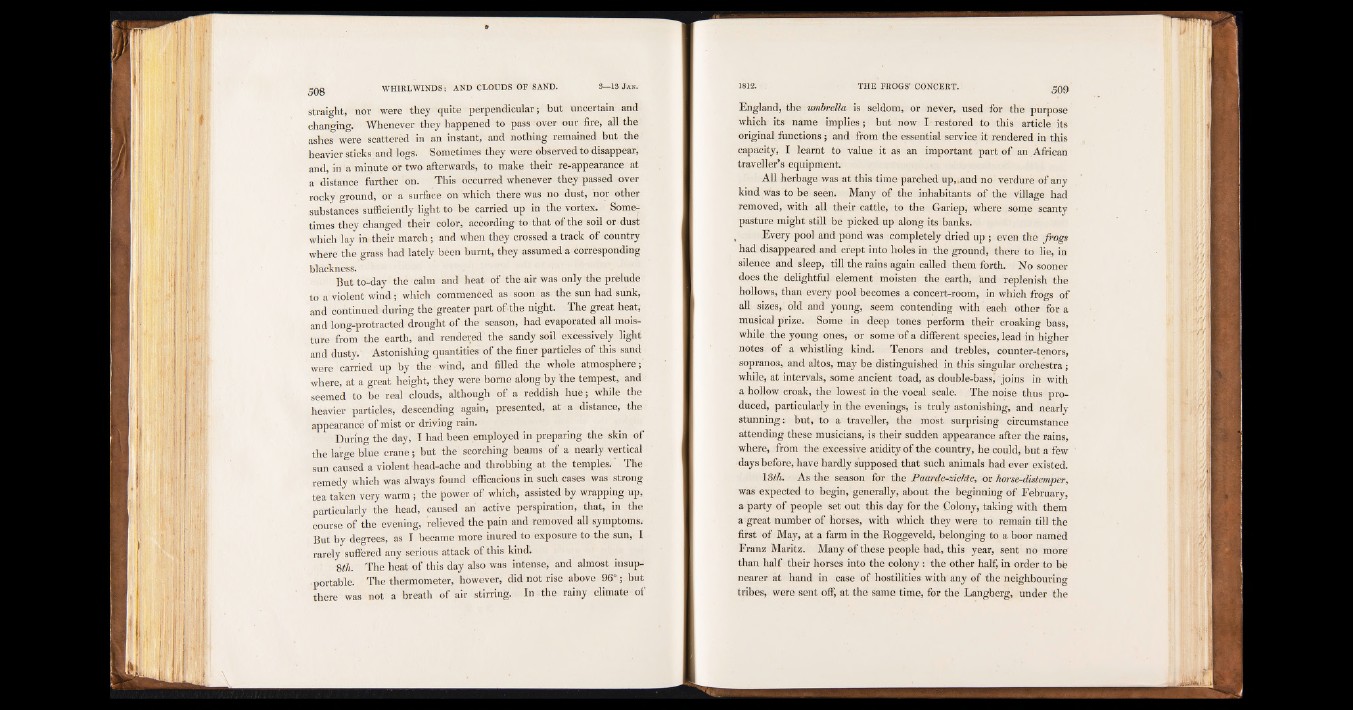
straight, nor were they quite perpendicular; but uncertain and
changing. Whenever they happened to pass over our fire, all the
ashes were scattered in an instant, and nothing remained but the
heavier sticks and logs. Sometimes they were observed to disappear,
and, in a minute or two afterwards, to make their re-appearance at
a distance further on. This occurred whenever they passed over
rocky ground, or a surface on which there was no dust, nor other
substances sufficiently light to be carried up in the vortex. Sometimes
they changed their color, according to that of the soil or dust
which lay in their march; and when they crossed a track of country
where the grass had lately been burnt, they assumed a corresponding
blackness.
But to-day the calm and heat of the air was only the prelude
to a violent wind; which commenced as soon as the sun had sunk,
and continued during the greater part of the night. The great heat,
and long-protracted drought of the season, had evaporated all moisture
from the earth, and rendered the sandy soil excessively light
and dusty. Astonishing quantities of the finer particles of this sand
were carried up by the wind, and filled the whole atmosphere;
where, at a great height, they were borne along by the tempest, and
seemed to be real clouds, although of a reddish hu e ; while the
heavier particles, descending again, presented, at a distance, the
appearance of mist or driving rain.
During the day, I had been employed in preparing the skin of
the large blue crane; but the scorching beams of a nearly vertical
sun caused a violent head-ache and throbbing at the temples. The
remedy which was always found efficacious in such cases was strong
tea taken very warm; the power of which, assisted by wrapping up,
particularly the head, caused an active perspiration, that, in the
course of the evening, relieved the pain and removed all symptoms.
But by degrees, as I became more inured to exposure to the sun, I
rarely suffered any serious attack of this kind.
8th. The heat of this day also was intense, and almost insupportable.
The thermometer, however, did not rise above 96°; but
there was not a breath of air stirring. In the rainy climate of
England, the umbrella is seldom, or never, used for the purpose
which its name implies; but now I-restored to this article its
original functions; and from the essential service it rendered in this
capacity, I learnt to value it as an important part of an African
traveller’s equipment.
All herbage was at this time parched up,.and no verdure of any
kind was to be seen. Many of the inhabitants of the village had
removed, with all their cattle, to the Gariep, where some scanty
pasture might still be picked up along its banks.
Every pool and pond was completely dried up ; even the frogs
had disappeared and crept into holes in the ground, there to lie, in
silence and sleep, till the rains again called them forth. No sooner
does the delightful element moisten the earth, and replenish the
hollows, than every pool becomes a concert-room, in which frogs of
all sizes, old and young, seem contending with each other fora
musical prize. Some in deep tones perform their croaking bass,
while the young ones, or some of a different species, lead in higher
notes of a whistling kind. Tenors and trebles, counter-tenors,
sopranos, and altos, may be distinguished in this singular orchestra ;
while, at intervals, some ancient toad, as double-bass, joins in with
a hollow croak, the lowest in the vocal scale. The noise thus produced,
particularly in the evenings, is truly astonishing, and nearly
stunning: but, to a traveller, the most surprising circumstance
attending these musicians, is their sudden appearance after the rains,
where, from the excessive aridity of the country, he could, but a few
days before, have hardly supposed that such animals had ever existed.
13th. As the season for the Paarde-zie/cte, or horse-distemper,
was expected to begin, generally, about the beginning of February,
a party of people set out this day for the Colony, taking with them
a great number of horses, with which they were to remain till the
first of May, at a farm in the Roggeveld, belonging to a boor named
Franz Maritz. Many of these people had, this year, sent no more
than half their horses into the colony : the other half, in order to bte
nearer at hand in case of hostilities with any of the neighbouring
tribes, were sent off, at the samp time, for the Langberg, under the